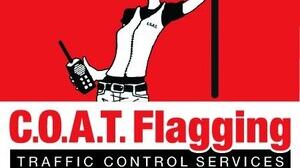If somewhat misleading, the logo for local flagging specialists Chick of All Trades does stop traffic. C.O.A.T.’s avatar, a hard hat- and vest-clad minx holding a “Safety First” sign, evolved from stick figures that company founder Val Solorzano doodled nearly 20 years ago while working through neighborhood honey-do lists as a freelance handywoman.
An opportunity to provide traffic control for the downtown transit mall overhaul led to a flourishing business with nearly 100 employees patrolling construction sites from Salem to Seattle. Despite the signature branding, Solorzano estimates men currently make up around 40% of C.O.A.T. staffers, but “there’s no way to change things now. It’s like Jantzen back in the day. They had a woman logo, and how many guys worked there?”
Acting as the first line of defense for municipal upgrades can be a thankless endeavor and carries significant risk for flagging professionals relying upon reflective “Stop/Slow” paddles and balloon lights as their only defense against angry or drowsy motorists. (While flaggers haven’t used actual flags for generations, Solorzano says federal regulations have disallowed the illuminated batons wielded by aircraft marshals because “studies show drunken drivers are more inclined to head toward blinking lights.”)
Unlike many of her competitors, Solorzano’s company has yet to lose anyone in an accident, and the alert responses of C.O.A.T. flaggers have likely saved more than a few lives by shepherding construction crews away from imminent collisions.
“It’s a hard job! You’re on your feet 10 hours a day, freezing from the cold or sweating out the summertime when the heat’s bearing down and the pavement’s adding another 15 degrees,” Solorzano says. “People get pissed off whenever traffic’s held up, but we’re just doing the best we can to make sure everybody goes home the same way they came to work.”
